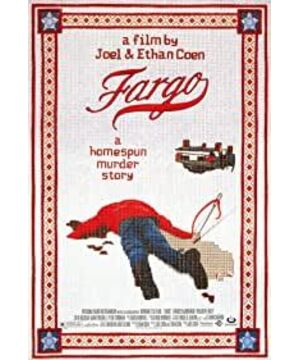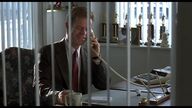People die for money-this is the clearest meaning of "Ice and Blood Storm". Stories based on this theme are not uncommon, such as Martin Scorsese's "The Wolf of Wall Street" and "The Good Guy", which are often annoying because of their strong admonitions. However, as the Coen brothers said through the mouth of the policewoman at the end of the film: "I really don't understand", they are not so much intended to educate the world, but rather they are asking the world: Why are you willing to take risks for money ?
Therefore, the two directors investigated various human risk-taking behaviors. The car sales manager, a weak person, a person who promised to everyone in front of everyone, had a huge unwillingness in his heart, and did a blackmailing business. He has two rules of life, one is to deceive, and the other is to deceive himself (that is, think that he can deceive others); father-in-law, arrogant, stingy, cautious, stubborn, carrying a money bag to change his daughter scene is like going to the execution ground; big man And the little man, born desperado, committed all murders regardless of social norms.
The director watched coldly, not hoping to find the answer to the question. Or, they already have the answer in their hearts: human beings are in a sad situation, and they don't have much choice, except to take risks, but to endure the status quo. Some people just live, wait, and despair; others risk their lives, resist, and struggle. Or, even this opportunity to choose one of the two is an illusion, and everyone is just struggling. Only by struggling can they survive and prove that they are alive.
From another perspective, "Ice Blood Storm" is just a story about a pregnant woman and her husband waiting for a child to be born. They are like hiding in the wilderness, maintaining minimal contact with the outside world. If it weren't for this serial murder, they would eat, sleep, and watch TV every day, plain, lonely, sweet, and sad. The murder made a splash in the couple's life, adding some interest and giving some "necessary" meaning.
We might as well understand it this way: Kidnapping and murder are the stories in the story. It is a book read by the policewoman before going to bed. It makes her react to life and makes her think about the purpose of life. In other words, the Coen brothers also explored the significance of the story to people in this film. If it is not more important than life itself, at least it can be on an equal footing with life. If there is no story, it would be boring to live. Perhaps we can say that the Coen brothers are explaining to us why they decided to take storytelling as their career.
I think that although the film of this pair of directors is so different from the films of Hou Xiaoxian and Jia Zhangke in appearance, they are all talking about life. The few idle pens in "Blood Storm" can be especially used as evidence. The policewoman was awakened from her sleep by a colleague's phone, and her husband got up in a daze to make breakfast for the policewoman. The policewoman went out and returned to ask her husband to help her pick up the car. Another example is the scene where the policewoman and her husband are lying in bed watching TV, or the close-up of her face while driving. These scenes cannot be omitted, because only at these times, the characters on the screen are no longer the objects to be observed, they are the director himself .
Another interesting pen is worth mentioning. The policewoman went to the Twin Cities to investigate the case and had a meal with an old classmate by the way. The old classmate cried bitterly, saying that he could not bear to be alone after his wife died. Later the policewoman learned that the old classmate had mental problems and had never been married. This story has nothing to do with the murder, but it constitutes an echo of the murder outside of the murder. It expands the subject of the film to all mankind, and summarizes the theme of the film in a straightforward and superficial way.
Going back to 10 years before "Ice Blood Storm" was released, in 1987, the Coen brothers filmed "Raising Arizona". That movie was about a couple who stole a baby from a rich man's house because his wife was unable to have children. It also introduces an adventure into the life of a couple as a compensation or solution to the ordinary life. "Ice Blood Storm" is a variation on "Raising Arizona". The difference is that the wife in this movie is really pregnant with a child. It can even be said that all the films of the Coen brothers tell a story. They are all questions about the meaning of life and a rewriting of Ulysses' adventure. The protagonists and viewers of the movie are both experiencing adventures and reading adventures.
View more about Fargo reviews











